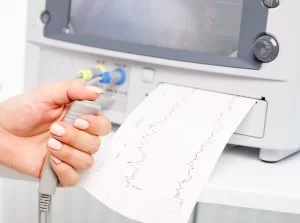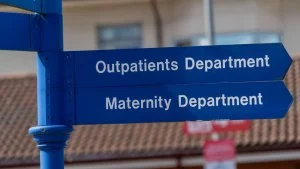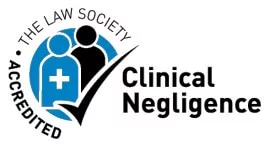£55,000 Settlement for Stillbirth Claim Against Chelsea and Westminster Hospital

Contact
Table of Contents
Successful Settlement for Stillbirth Claim Against Chelsea and Westminster Hospital NHS Foundation Trust
Background
Nick Leahy, an Associate in our Clinical Negligence department, has recently settled a claim against Chelsea and Westminster Hospital NHS Foundation Trust on behalf of his client whose baby was stillborn at the West Middlesex University Hospital on 29 April 2021.
Initial Admission and Treatment
Our client, KJ, booked in for what was her seventh pregnancy on 20 November 2020 at the West Middlesex University Hospital. She was 11 weeks pregnant. At booking, her BMI was 29, blood pressure was 99/79, and HR was 93 bpm. Her urine showed a trace of protein. She had experienced severe nausea and vomiting at the outset of her pregnancy and was prescribed cyclizine to treat this by her GP.
Emergency Admission
Our client was admitted to West Middlesex University Hospital A&E on 25 November 2020 and was seen by the on-call gynaecology team. She had a history of hyperemesis for the past ten days and had vomited three times already that day. She was given IV fluids and IV antiemetics and put onto the hyperemesis pathway. She was later deemed to be feeling better, and so was discharged home on oral medication.
Anomaly Scan and Subsequent Appointments
Our client had an anomaly scan at 20+6 weeks on 25 January 2021. It showed that her placenta was anterior and low-lying. No obvious fetal abnormality was seen, and a plan was made to rescan at 34 weeks to check the placental position and fibroids.
It was noted that our client did not attend her 22-week obstetric antenatal clinic appointment, however, her notes were reviewed by the consultant obstetrician and a plan was made to rebook the obstetric appointment.
Consultant Review and Pain Management
Our client was seen in the antenatal clinic at West Middlesex University Hospital by a Consultant Obstetrician at 26 weeks, on 2 March 2021. There is no documentation of any abdominal palpation, however, there was a discussion with our client about her low-lying placenta and concerns about a possible abnormally invasive placenta, considering her 3 previous caesarean section births.
On 28 March 2021, at 29+5 weeks, our client presented to maternity triage at West Middlesex University Hospital, with tenderness around her LSCS scar and pain when she touched it or moved. She was noted not to have taken analgesia yet and was given 1mg of paracetamol. She was referred to a doctor at 19:00 and was eventually reviewed by a registrar at 21:30. The doctor noted that our client’s uterus appeared large for dates and that her abdomen was generally firm. It was noted that she had general tenderness over her caesarean section scar, and there was a risk of scar rupture.
Hospital Stay and Discharge
Our client was then reviewed by a consultant obstetrician the following morning. She noted that the CTG showed intermittent tightenings however that this was otherwise normal. The consultant was of the view that it was unlikely to be threatened pre-term labour. A plan was made that if this settled, our client could go home. It was noted that it was preferable for her to have an IV iron infusion before she was discharged.
Our client’s care was then handed over to another midwife. It was noted that as the ward was busy that evening, it was unsafe to administer monofer at present. The midwife recorded that a GTT had been arranged for 6 April 2021. The midwife did however note that it was difficult to monitor our client’s baby, and noted “? Polyhydramnios”. She noted that overall the CTG was reassuring.
Further Complications and Final Admission
By 19:30 that evening, it was noted by the midwife that our client was reporting pressure to open her bowels. The labour ward coordinator contacted the obstetrician who was in theatre and the plan was for a senior obstetric review. Later, at 20:05 our client was seen by the on-call gynaecology doctor. On abdominal palpation, it was noted that our client appeared large for dates, and again a query of polyhydramnios was made. A vaginal examination was performed with consent and our client was to remain as an inpatient whilst she had ongoing tightenings. A plan was made for her to have an ultrasound scan the following day to assess fluids.
On the morning of 30 March 2021, our client was reviewed by a midwife. On abdominal palpation, her abdomen was again noted to appear large for dates, and again a query of polyhydramnios was made. A CTG was commenced at 02:56 to assess fetal wellbeing. This was discontinued at 03:30 and again it was noted that our client was for USS later that day.
Tragic Outcome
At 08:30 on 30 March 2021, our client was reviewed by an ST3 doctor. Our client reported that she was feeling good fetal movements, no abdominal pain, and no scar tenderness. The doctor noted that our client was keen to go home, and it was planned to arrange for an outpatient GTT and an IV iron infusion. The plan for an ultrasound scan at 34 weeks was again noted, followed by the plan for an antenatal follow-up. She was then discharged that day.
The next time our client attended the Queen Mary Maternity Unit at West Middlesex Hospital was on the morning of 28 April 2021. This was at 34+1 weeks to check the placental position. On this ultrasound scan, no fetal heartbeat was present. Our client reported that she had not felt fetal movements for the previous two days. A second radiographer came and sadly confirmed on scanning that our client’s baby had passed away. It was noted that our client was also experiencing pain in her LSCS scar.
Bereavement Care
Our client was then moved to the bereavement suite for one-to-one midwifery care and gave birth to a stillborn baby girl the following day.
NHS Trust Investigation
The Trust commenced their own internal investigation following the above events, which found the following:
- No 16 week or 28 week appointment. No GAP chart generated or completed in notes.
- Our client should have had serial growth USS based on her second baby being SGA (3rd centile).
- Follow-up USS for placental location booked for 34 weeks and not 32 weeks.
- No follow-up when our client did not attend a 31-week ANC appointment.
- No USS when admitted at 30 weeks to explore the suspicion of polyhydramnios.
- There is not a fully effective failsafe system in place to ensure that all women actually have the correct appointments made throughout their pregnancy.
Civil Claim for Damages
Following receipt of the investigation report, our client instructed Nick Leahy to pursue a civil claim against the hospital Trust for medical negligence. The first step was to obtain all of our client’s medical records, following which independent expert evidence was obtained from a midwifery expert, and from a consultant obstetrician. Both of these reports identified breaches of duty in the antenatal care given to our client, which resulted in there being inadequate antenatal surveillance of fetal growth.
Our expert obstetrician was of the view that had the appropriate surveillance taken place, by 28 March 2021 the symphysis fundal height (SFH – a measurement used to help clinicians determine if a baby is developing correctly) would have been above the 97th centile, and given the suspicion of polyhydramnios, an ultrasound scan would have been performed. This ultrasound scan would have shown our client’s baby to be small for gestational age, and would have shown polyhydramnios. This would have been deemed to be moderate to severe and would have triggered a referral to a fetal medicine specialist.
Our obstetrician was of the opinion that our client would then have been counselled regarding the possibility of both chromosomal abnormality and genetic syndromes. An amniocentesis would have been offered. Our client would also then have been offered a viral infection screen to exclude congenital infection. Depending on the results of these investigations, pregnancy management would have been planned. There would have been close monitoring of the pregnancy with serial scans and assessment of fetal growth, liquor, and dopplers. On the balance of probabilities, our client would have been offered early delivery and would have avoided the stillbirth of her baby daughter.
Settlement
Following receipt of the expert evidence, a Letter of Claim was drafted and served on the Defendant Trust, outlining the allegations of negligence being made against them. The Trust admitted liability at the first opportunity, and specifically that absent their breaches of duty, our client’s baby would have been born 2 weeks earlier and been alive at delivery.
Our client suffered psychiatric injury as a result of the loss of her daughter. Nick instructed an independent consultant perinatal psychiatrist to prepare a report on our client’s condition and prognosis. Following receipt of this evidence, which diagnosed our client with a Prolonged Bereavement Disorder (ICD-11: 6B42), a Schedule of Loss was finalised and settlement negotiations with the Trust’s solicitors commenced. The case was settled on 15 February 2024 for £55,000.
Client’s Comment
Following the settlement, our client commented:
“Nicholas Leahy at Osbornes Law were a great help during a very difficult time for me and my family. Nick fought very hard for us and was always there for us if we needed advice. We as a family are happy with the compensation they managed to get for us and would recommend Osbornes Law to all
Have you experienced a similar issue?
Specialist legal advice and support
Osbornes Law specialises in assisting families who have experienced birth injuries. We have represented families who have faced the loss of a newborn during childbirth or where insufficient maternity care, whether it occurred before, during, or after labour, resulted in harm to the baby or mother.
Our dedicated team has extensive experience in supporting families with birth injury claims and holding NHS Trusts accountable. This expertise is complemented by a deep understanding of medical terminology and procedures, allowing us to identify irregularities in clients’ medical records effectively.
To speak with Nicholas Leahy about your situation and to find out if it may be possible for you to bring a claim, contact us by:
- Filling in our online enquiry form; or
- Calling us on 020 7485 8811
Share this article
Contact us today
Call us 020 7485 8811
Email us Send us an email and we’ll get back to you
"Nicholas Leahy works extremely hard and understands the commercial sensitivities of clinical negligence litigation."
Excellent service from Osbornes throughout on a difficult clinical negligence claim. Nicholas Leahy who handled the claim was responsive and professional throughout, while also providing pragmatic advice and clear drafting.
Working with Osbornes Law was the best decision I could have made. Nick was really attentive to my issue and did a very thorough job. He truly made the process headache free! Highly recommend them.
Nick Leahy has been my Solicitor throughout this journey and has been absolutely amazing; kind, approachable and extremely supportive... Through some dogged determination by Nick we achieved our goal without having to go to trial. I cannot thank Nick, Stephanie and all of the team at Osbornes highly enough for achieving a very favourable settlement, the outcome of which will make a huge difference to myself and my family.
Related InsightsVIEW ALL
- 2.10.2022
Tragic Case Involving a Home Water Birth
Introduction to the case Nicholas Leahy is acting for a young woman who had a water birth at home and...
Read more - 8.9.2022
Poor interpretation of CTG can result in stillbirth...
Poor interpretation of a Cardiotocograph, more commonly known as a CTG, is a leading cause of stillbirth and brain injuries...
Read more - 23.2.2022
Women from ethnic minorities experience worse maternity care
It has been reported today that the government has set up a new task force to look into why there...
Read more - 2.1.2022
Justice for Family Who Faced Loss of Newborn
Osbornes Law specialises in assisting families who have experienced birth injuries. We have represented families who have faced the loss...
Read more - 1.7.2021
Stillbirth following water birth at home
Nicholas Leahy acted for a young woman who had a water birth at home and two midwives were allocated to...
Read more - 13.10.2020
Parental Bereavement Leave & Pay
What is Parental Bereavement Leave and Pay? Parental Bereavement Leave and Pay is something that many parents will not be...
Read more - 11.10.2019
Mum had stillborn baby after being sent home
Tragedy as Mum loses baby after being sent home twice A young mum has described the horror of losing her...
Read more - 20.10.2014
Doppler scan could prevent half of stillbirths
Doppler scans could prevent as many as 2000 stillbirths per year The press has reported that as many as half of...
Read more
















